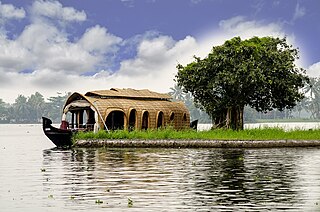
Alappuzha district, is one of the 14 districts in the Indian state of Kerala. It was formed as Alleppey district on 17 August 1957, the name of the district being changed to Alappuzha in 1990. Alappuzha is the smallest district of Kerala. Alleppey town, the district headquarters, was renamed Alappuzha in 2012.

The Kingdom of Travancore, also known as the Kingdom of Thiruvithamkoor or later as Travancore State, was a kingdom that lasted from c. 1729 until 1949. It was ruled by the Travancore Royal Family from Padmanabhapuram, and later Thiruvananthapuram. At its zenith, the kingdom covered most of the south of modern-day Kerala and the southernmost part of modern-day Tamil Nadu with the Thachudaya Kaimal's enclave of Irinjalakuda Koodalmanikyam temple in the neighbouring Kingdom of Cochin. However Tangasseri area of Kollam city and Anchuthengu near Attingal in Thiruvananthapuram were parts of British India.
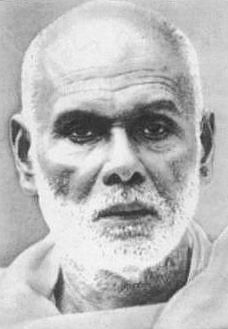
Sree Narayana Guru was a philosopher, spiritual leader and social reformer in India. He led a reform movement against the injustice in the caste-ridden society of Kerala in order to promote spiritual enlightenment and social equality. A quote of his that defined his movement was "one caste, one religion, and one god for all human beings." He is the author of the Advaita poem Daiva Dasakam, which is one of the most used poem in Kerala for community prayer.

Pathanamthitta District, is one of the 14 districts in the Indian state of Kerala. The district headquarters is in the town of Pathanamthitta. There are four municipalities in Pathanamthitta: Adoor, Pandalam, Pathanamthitta and Thiruvalla.

Mahakavi Kumaran Asan was a poet of Malayalam literature, Indian social reformer and a philosopher. He is known to have initiated a revolution in Malayalam poetry during the first quarter of the 20th century, transforming it from the metaphysical to the lyrical and his poetry is characterised by its moral and spiritual content, poetic concentration and dramatic contextualisation. He is one of the triumvirate poets of Kerala and a disciple of Sree Narayana Guru. He was awarded the prefix "Mahakavi" in 1922 by the Madras university which means "great poet".
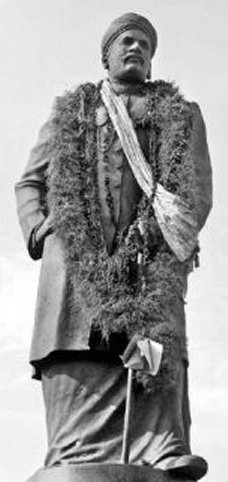
Mahatma Ayyankali was an Indian politician, prominent social reformer, educator, economist, lawmaker, and revolutionary leader. He worked for the advancement of the oppressed people in the princely state of Travancore. His struggle resulted in many changes that improved the socio-political structure of Kerala. His determined and relentless efforts changed the lives of Dalits. He is known as the King of Pulaya.

Kuttanad is a river delta landscape region in the state of Kerala, India, known for its vast paddy fields and geographical peculiarities. It is in the Districts of Alappuzha, Kottayam and Pathanamthitta. The region has the lowest altitude in India, and is one of the few places in the world where farming is carried on around 1.2 to 3.0 metres below sea level,, using rice paddies largely located on reclaimed land amid the delta. Kuttanad is historically important in the ancient history of South India and is the major rice producer in the state. Farmers of Kuttanad are famous for Biosaline Farming. The United Nations Food and Agriculture Organization (FAO) has declared the Kuttanad Farming System as a Globally Important Agricultural Heritage System (GIAHS) in 2013.

Alappuzha, formerly known as Alleppey, is a city and municipality in the Alappuzha district of Kerala, India. It is the district headquarters of the district, and is located about 130 km (80.8 mi) north of the state capital Thiruvananthapuram. As per the 2011 Indian census, Alappuzha has a population of 240,991 people, and a population density of 3,675/km2 (9,520/sq mi).

C. Kesavan was a politician, social reformer, statesman and the chief minister of Travancore-Cochin during 1950–1952. He led the Nivarthana agitation in Travancore to gain the democratic authority for the citizens to decide on the legislation and to attain opportunities regardless of caste or social and economical status.
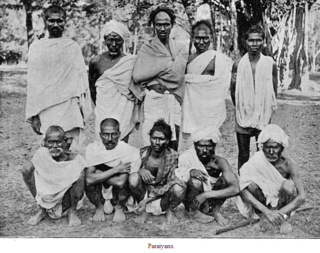
Paraiyar, Parayar or Maraiyar is a caste group found in the Indian states of Tamil Nadu and Kerala and in Sri Lanka.
E. V. Krishna Pillai was an Indian writer of Malayalam literature and member of Sree Moolam Popular Assembly of Travancore. He was known to be a multi-talented personality and excelled as an advocate, Member of Legislative Assembly, editor and writer. During his short life, he wrote comedies, dramas, short stories and an autobiography. He was also a columnist and a caricaturist. He was an eminent satirist and a genius in comedy.
Kanakku Chembakaraman Kesava Pillai (1868–1914) was an Indian composer of Carnatic music and a poet of Malayalam literature. He was the Poet Laureate of Travancore and was known for Kesaveeyam, a mahakavya in Malayalam, two attakathas and several bhajans and kirtans. He also translated the Sanskrit text, Narayaniyam, into Malayalam under the title, Bhashanarayaniyam.

Mooloor S. Padmanābha Panicker (1869-1931) was a poet and a prominent social reform activist from the Travancore region of present-day Kerala.

T. K. Madhavan, also known as Deshabhimani Madhavan, was an Indian social reformer, journalist and revolutionary, who was involved with the Sree Narayana Dharma Paripalana Yogam. He hailed from Alappuzha, Kerala and led the struggle against Social discrimination which was known as Vaikom Satyagraha.
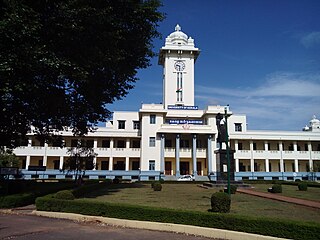
The importance and antiquity of education in Kerala are underscored by the state's ranking as among the most literate in the country. The educational transformation of Kerala was triggered by the efforts of both Church Mission Society missionaries like Jon Munro and clergy of Catholic church like Fr Kuriakose Elias Chavara and Fr Charles Lavigne and were the pioneers that promoted mass education in Kerala, in the early decades of the 19th century. The local dynastic precursors of modern-day Kerala, primarily the Travancore Royal Family, the Nair Service Society, Sree Narayana Dharma Paripalana Yogam, and Muslim Educational Society (MES), also made significant contributions to the progress on education in Kerala. Local schools were known by the general term kalaris, some of which taught martial arts, but other village schools run by Ezhuthachans were for imparting general education. Christian missionaries and British rule brought the modern school education system to Kerala. Ezhuthu palli was the name used in earlier times. The word was derived from the schools run by the Buddhist monasteries. For centuries, villages used to set up an ezhuthupally or ashan pallikoodam with one or two teachers. Students used to go this school from nearby areas and learn languages, literature, mathematics, grammar etc. After completing this, students may continue study about specific subjects such as ayurveda, astrology, accounting etc. Censuses during the 1800s showed that Travancore, Cochin, and Kannur areas have many such schools.

The Sree Narayana Dharma Paripalana Yogam (S.N.D.P) is a social service organization that has been representing the Ezhava community from the Indian state of Kerala since 1903.

C. V. Kunhiraman was an Indian social reformer, journalist and the founder of Kerala Kaumudi daily. A follower of Sree Narayana Guru, Kunhiraman was the author of a number of books covering the genres of novels, short story, poetry, biographies and essays. He was one of the leaders involved in the Vaikom Satyagraha of Reformation movement in Kerala which led to the Temple Entry Proclamation.
Vettikkavala is a village located in the Kollam district in the state of Kerala, India. The village is famous for Shiva-Vishnu temples which hosts a special deity called Vathukkal Njaali Kunju. An annual celebration of Pongala is held at the temple. The village is also well known for temple arts and a palace constructed by Sree Moolam Thirunal.
The Sree Moolam Popular Assembly in the erstwhile state of Travancore was the first popularly elected legislature in the history of India.

The reformation movement in Kerala refers to a socio-cultural shift that began in the late 19th century, resulting in significant transformations in the social fabric of the southern Indian state of Kerala.













